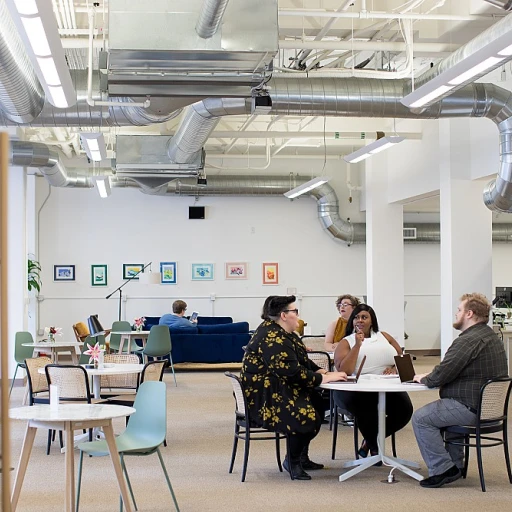
Defining Workplace Services in a Remote Setting
The Essence of Workplace Services in Virtual Spaces
Understanding workplace services in a remote setting calls for a shift from traditional physical office structures to versatile and nimble digital workplaces. These services encompass an array of support mechanisms that ensure employees can effectively collaborate, communicate, and maintain productivity regardless of their physical location. In a broader sense, workplace services serve as pillars of the modern work environment, facilitating seamless integration between technological tools and human workforce. The evolution towards remote work necessitates a profound digital transformation, which involves adopting cloud-based management systems and advanced digital tools. This transformation supports not only the technical infrastructure needed for remote operations but also the cultural shift towards embracing remote and hybrid work models. In a digital workplace, services range from virtual collaboration tools to integrated workplace management systems (IWMS). This holistic management approach aims to enhance the employee experience by ensuring employees have the resources needed to perform effectively. These resources often include digital workplace solutions that enhance the efficiency of communication, information sharing, and task management. Moreover, workplace management must adapt to provide adequate service desks and IT support in real time, addressing technical issues that could hamper productivity. In the absence of a physical office space, these services become crucial in fostering an engaging and satisfying work environment. When digital workplace services are well-envisioned and implemented, they create a seamless experience for employees work across diverse locations. This integration strengthens employee satisfaction and, ultimately, supports the overall success of the business. For those looking to establish an effective home office as part of this remote infrastructure, understanding the key components can greatly contribute to the realization of remote work success. To explore more insights on crafting a conducive home office, visit this ideal home office guide. As we delve further into this topic, the importance of workplace services grows evident, particularly their impact on employee collaboration and the management of dispersed work teams.The Importance of Workplace Services for Remote Teams
The Significance of Workplace Services in Remote Work Environments
In the evolving landscape of remote work, workplace services have become a cornerstone for ensuring employee satisfaction and productivity. These services are not just about providing the necessary tools but also about creating a seamless work environment that supports collaboration and efficiency.
One of the primary roles of workplace services is to enhance the employee experience. By integrating digital solutions and cloud-based tools, businesses can offer a more flexible and responsive workplace management system. This is crucial in a digital workplace where employees need to access resources in real time and from any location.
Moreover, effective workplace services contribute to better workplace management by streamlining processes and reducing the friction often associated with remote work. This includes everything from managing office space virtually to providing a robust service desk that can handle employee queries and issues efficiently.
As businesses continue to adapt to the modern workplace, the importance of workplace services in supporting a hybrid work model cannot be overstated. These services help bridge the gap between physical and digital workplaces, ensuring that employees have a consistent and supportive workplace experience regardless of their location.
For more insights on how remote work is shaping the future of workplaces, you can explore the new era of working from home for employees.
Challenges in Implementing Workplace Services Remotely
Overcoming Hurdles in Remote Service Implementation
Implementing workplace services in a remote setting comes with its own set of challenges. One primary hurdle is ensuring effective communication and collaboration among employees when they are scattered across different locations. This can impact the overall employee experience if not handled efficiently. Transitioning to a digital workplace requires restructuring of traditional business management systems. Businesses need to invest in digital tools like cloud-based platforms that facilitate collaboration and data sharing in real time. However, a mismatch between digital tools and office requirements can lead to decreased productivity. Hence, it's crucial to choose the right workplace solutions tailored to specific organizational needs. Additionally, maintaining the quality of workplace service support remotely can be difficult. With employees working in a variety of environments, providing them with a consistent and seamless service desk experience is key. This necessitates a robust workplace management system that can adapt to evolving work environments. Security is another significant concern. When digital transformation takes center stage, safeguarding data while ensuring employee satisfaction becomes vital. Businesses are required to implement strong cybersecurity measures to protect both personal and company information in digital workplaces. Moreover, managing the balance between hybrid work and remote work is essential for modern workplace settings. Remote work solutions need to be integrated seamlessly into existing systems to provide a cohesive work space for all employees—regardless of their location. For those looking to enhance remote work efficiency, leveraging technological tools such as remote assist can provide tangible benefits. These solutions can enhance productivity by resolving technical issues more quickly and improving overall employee experience in remote settings.Technological Tools Enhancing Remote Workplace Services
Technological Solutions Transforming the Remote Work Environment
In today's digital work landscape, technology is at the forefront of enhancing workplace services, particularly for remote teams. The shift to remote work has catalyzed the adoption of various digital tools and platforms designed to improve collaboration, communication, and productivity for employees working outside a traditional office space. These tools play an essential role in workplace management, offering innovative workplace solutions that bridge the gap between physical and digital workplaces.
For effective management of workplace services in a remote setting, businesses leverage an array of technology offerings:
- Cloud-Based Platforms: These provide reliable, secure cloud storage and data management, allowing employees to access essential resources in real time from anywhere. This ensures smooth continuity of work, contributing to a seamless employee experience.
- Collaboration Tools: With platforms like Slack, Microsoft Teams, and Zoom, digital workplaces foster a connected work environment. These tools facilitate communication and collaboration among team members, regardless of their physical location, boosting employee satisfaction and team cohesion.
- Project Management Systems: Tools like Trello, Asana, and Monday.com offer structured approaches to project and task management, enhancing employee productivity and ensuring workplace services are executed efficiently. Integrated workplace management systems ensure tasks are aligned with business goals.
- Service Desks and Support Solutions: Digital service desks provide employees with support in managing technical issues or accessing workplace services, thereby maintaining a productive and supportive digital workplace.
The digital transformation of workplace services is pivotal in creating a balanced hybrid work model. By leveraging technological tools, businesses can offer an elevated workplace experience, almost mimicking an integrated workplace within a traditional office while ensuring employees work in a supportive, efficient, and modern workplace.
Best Practices for Managing Remote Workplace Services
Effective Strategies for Managing Workplace Services Remotely
In the evolving landscape of remote work, managing workplace services effectively is crucial to safeguarding productivity and employee satisfaction. Achieving this requires a focus on digital workplace management strategies that leverage technology while ensuring seamless human interaction within digital environments. Here are some noteworthy practices:
- Leverage Digital Tools: Using cloud-based tools and platforms not only facilitates real-time collaboration but also allows for constant oversight of workplace services. This is imperative for ensuring that employee work environments are equipped for sustaining high productivity levels.
- Streamline Service Desk Operations: Implement a centralized service desk system that prioritizes quick response times and supports employees globally. These digital solutions should facilitate a rapid resolution of workplace issues, enhancing overall employee experience.
- Encourage Employee Feedback: Conduct regular surveys and feedback sessions to understand employee experience in the remote setting. Insights gathered inform the refinement of workplace solutions, contributing towards a cohesive work environment.
- Integrate Workplace Solutions: Ensure that digital tools and services are integrated to provide a seamless experience. This includes the use of a comprehensive workplace management system that converges all digital workplace elements for a coherent approach.
- Focus on Hybrid Work Models: In scenarios where hybrid work is possible, strategically manage office space allocation and resources to support both in-office and remote employees. This balance supports a modern workplace ethos and improves employee satisfaction.
Applying these practices enhances the digital transformation journey, positioning businesses to provide exceptional support and foster an environment of success for both remote and hybrid teams.













